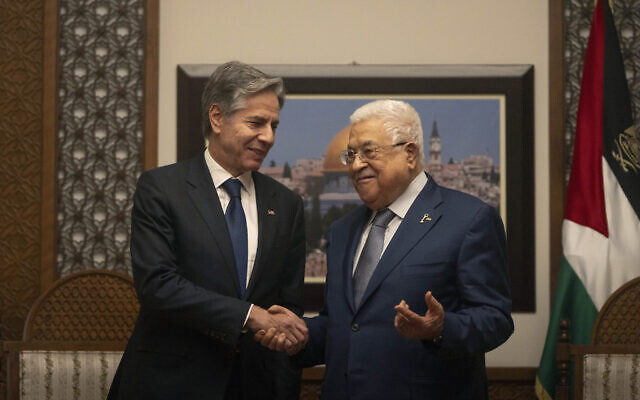



US Secretary of State Antony Blinken met with Palestinian Authority President Mahmoud Abbas on Wednesday to seek governance reforms as part of US efforts to rally the region behind postwar plans for Gaza that also include concrete steps toward a Palestinian state.
Blinken says he has secured commitments from multiple countries in the region to assist with rebuilding and governing Gaza after Israel’s war against Hamas, and that wider Israeli-Arab normalization is still possible, but only if there is “a pathway to a Palestinian state.”
The approach faces serious obstacles. Prime Minister Benjamin Netanyahu’s government is adamantly opposed to the creation of a Palestinian state alongside Israel, and the autocratic, Western-backed Palestinian leadership, whose forces were driven from Gaza when terrorist organization Hamas took over in 2007, lacks legitimacy in the view of many Palestinians.
The war in Gaza is still raging with no end in sight, fueling a humanitarian catastrophe in the tiny coastal enclave. The fighting has also stoked escalating violence on Israel’s northern border as Lebanon’s Iran-backed Hezbollah terror group fires missiles and drones nearly daily, which it says is in support of Gaza, raising fears of a wider conflict.
On his fourth visit to the region since the war began three months ago, Blinken has met in recent days with the leaders of Saudi Arabia, Jordan, Qatar, the United Arab Emirates, and Turkey. He says they are open to contributing to postwar plans in return for progress on creating a Palestinian state.
After meeting with Netanyahu and other top Israeli officials on Tuesday, Blinken delivered a stark message, saying Israel must stop undercutting the Palestinians’ ability to govern themselves with its expansion of settlements, home demolitions and evictions in the West Bank.

But he also said the Palestinian Authority “has a responsibility to reform itself, to improve its governance,” and that he would discuss that with the 88-year-old Abbas, who has not held elections since 2005 and lacks support among his own people.
The Palestinian Authority governs parts of the West Bank under interim peace deals reached in the 1990s and cooperates with Israel on security matters. But it has been powerless to prevent the expansion of Israeli settlements in territory it wants for a future state, and there have been no serious or substantive peace talks since Netanyahu returned to office in 2009.
US President Joe Biden’s administration has been unable to get Israel to make even relatively minor concessions to the Palestinians, like turning over all the tax revenue it collects on their behalf, or allowing the reopening of a US consulate to serve Palestinians in Israeli-annexed East Jerusalem.
Later Wednesday, Abbas was set to met with the leaders of Jordan and Egypt, two US allies who have long served as mediators in the Israeli-Palestinian conflict, in Jordan’s Red Sea city of Aqaba.

Israel has vowed to keep fighting until it crushes Hamas and returns the scores of hostages still held by the group after its brutal October 7 onslaught that triggered the war. In the shock assault, some 3,000 terrorists invaded Israel to murder nearly 1,200 people, mainly civilians, taking over 240 hostages of all ages while weaponizing sexual violence on a mass scale.
Israeli officials say the campaign will continue through the rest of the year, and its own postwar plans call for open-ended military control over the territory, from which it withdrew soldiers and settlers in 2005.
Nearly 85% of Gaza’s population of 2.3 million have been driven from their homes by the fighting, and a quarter of its residents face starvation, with only a trickle of food, water, medicine and other supplies entering through an Israeli siege aimed at weakening the Hamas regime.
Blinken said more food, water, medicine and other aid needs to enter and be distributed effectively, and he called on Israel to “do everything it can to remove any obstacles.”
The offensive has reduced much of northern Gaza, including Gaza City, to a moonscape, raising concerns over whether the hundreds of thousands of Palestinians who fled from those areas will ever be able to return.
Far-right members of Netanyahu’s government have called for them to be resettled elsewhere, which critics say would amount to ethnic cleansing.

Blinken said the US was opposed to any such scenario and that resettlement is not the policy of the Israeli government. He also said he had secured agreement on a UN inspection mechanism in northern Gaza to evaluate how and when people can return.
Since the war began, Israel’s offensive has killed more than 23,200 Palestinians, roughly 1% of the territory’s population, and more than 58,000 people have been wounded, according to the Health Ministry in Hamas-run Gaza. About two-thirds of the dead are women and children, health officials say. These figures cannot be independently verified, and are believed to include both civilians and combatants, as well as victims of terror groups’ own rocket misfires.
The Israeli military says it tries to avoid harming civilians and blames the high toll on Hamas because the terrorists situate their military infrastructure in densely populated areas, including in homes, schools, hospitals and mosques. According to the IDF, Israeli troops have killed some 8,500 Hamas terrorists in Gaza, in addition to some 1,000 terrorists inside Israel on October 7.
One hundred and eighty-six IDF soldiers have been killed in the Gaza operation to date.
